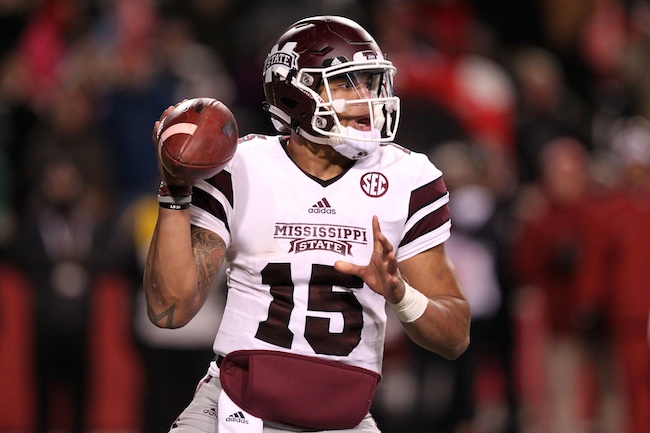
With Dak Prescott leaving, who is next 3-year starting QB star in SEC?
By John Hollis
Published:
Mississippi State quarterback Dak Prescott is in a league all to himself within the SEC.
The Bulldogs senior, who was a first-team, all-conference selection this season, has been the only three-year starter at quarterback in recent years in a league not likely to see another for a while. The dearth of experience at the game’s most visible position partly explains the myriad offensive issues seen throughout the league that took away some of the SEC’s national luster this fall.
Prescott, who will lead Mississippi State into the Belk Bowl to face N.C. State on Dec. 30, entered 2015 as one of just four returning starting quarterbacks in the SEC, along with Texas A&M’s Kyle Allen, Arkansas’ Brandon Allen and Missouri’s Maty Mauk.
Prescott had a banner season, as did the Razorbacks’ Allen, who was the closest thing to a three-year starter the SEC had beyond Prescott. He started as both a junior and senior for the Razorbacks and even started one game as a sophomore in 2013 before taking over for good the following season.
Things didn’t work out nearly as well for the other returning signal callers.
Kyle Allen, a former five-star recruit, was in and out of the lineup this season as he competed with true freshman Kyler Murray for the job and eventually announced his decision to transfer. Murray followed suit a week later and announced his plans to transfer.
Mizzou’s Mauk, who started as a freshman two years ago, played poorly, was suspended for undisclosed reasons for much of this year and his status with the program remains unclear.
Those schools were hardly alone with quarterback issues and instability.
Georgia, Florida, South Carolina, Vanderbilt, Kentucky, and Auburn also endured quarterback carousels that saw disappointing play lead to more than one player giving it a go at the most pivotal offensive position.
So how did it get to this point for the SEC, and is there relief on the way?
You just can’t lose quality future NFL players like Texas A&M Heisman Trophy winner Johnny Manziel, Alabama’s A.J. McCarron, Georgia’s Aaron Murray and South Carolina’s Connor Shaw following the 2013 season and not expect an immediate drop-off .
Additional losses the following season included the likes of Auburn’s Nick Marshall, Alabama’s Blake Sims and Ole Miss quarterback Bo Wallace, among others.
The many losses forced teams to more often throw true freshmen into the mix earlier than in past years, and the results weren’t pretty. Both Allen and Murray were coveted five-star recruits, but struggled in the face of the quicker, more advanced college game. The same held true for Missouri’s Drew Lock, who replaced Mauk.
League coaches will need to be more patient, but the pressure to win immediately only becomes more pronounced in the SEC. Both Florida and Georgia could be handing the keys to the kingdom to true freshmen by Opening Day in 2016.
Tennessee’s Joshua Dobbs will be the SEC’s next three-year starter next fall. Dobbs, a very capable dual-threat quarterback who will be a senior next fall, started four games as a freshman in 2013. He began the final five games of 2014 in place of the injured Justin Worley and has been at the helm ever since.
Like Prescott, Dobbs has been given time to grow into the position and the results have been positive for UT.
And, perhaps not coincidentally, Tennessee figures to be among the early favorites to win the SEC East and contend for the league championship next year.
That doesn’t mean, however, that schools that choose to go with first-year starters at quarterback can’t be successful. Five of the previous six Heisman Trophy winners were quarterbacks, with three being first-year starters. Four of the past six national champions featured first-year starting quarterbacks.
But those were the exceptions and hardly the norms as the SEC is finding out now.
There is no substitute for experience.
John Hollis is a contributing writer for Saturday Down South. He covers Georgia and Florida.







